#the consulate and empire
Text
Female French Painters during the Napoleonic Era:
This is a short compilation to highlight some of the work of really awesome and overlooked female artists in France during the early 19th century and the late 18th century. There honestly were a lot of professional female painters during this time period due to more freedom of expression, and female artists were being celebrated and encouraged from the very top of French society.
Tumblr only allows a limited number of pictures in one post, so I shall be posting a lot more to continue sharing the beautiful artwork from women during this time.
Marie-Denise Villers


Une étude de femme d'après nature (Study of a Woman), 1802
Portrait of Marie Joséphine Charlotte du Val d'Ognes, 1801
Marie-Guillemine Benoist

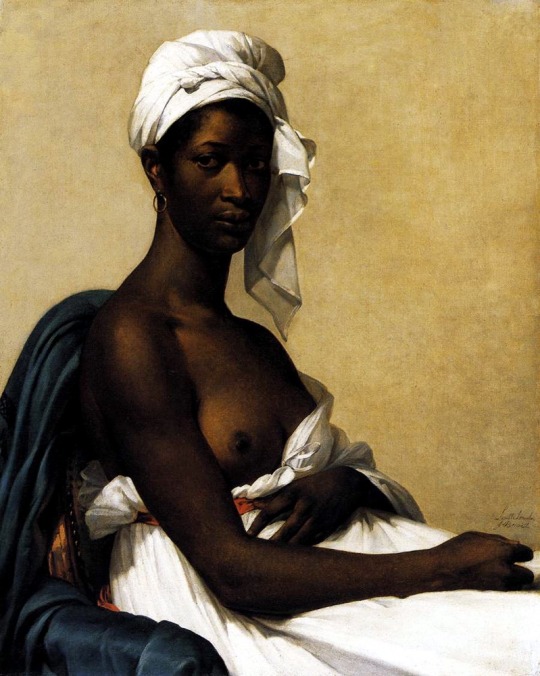
Pauline Bonaparte, Princesse Borghese, 1808
Portrait d'une femme noire (Portrait of Madeleine), 1800
Constance Marie Charpentier

Melancholy, 1801
Marguerite Gérard

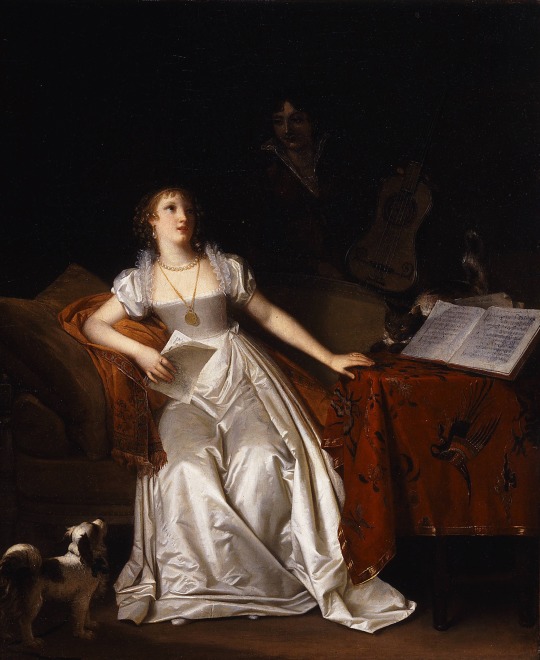
Motherhood, circa 1800s
Prelude to a Concert, 1810
Jeanne-Elisabeth Chaudet


Portrait of a lady as a novice, 1811
Gustava and Wilhelmina Armfelt, 1802
Constance Mayer
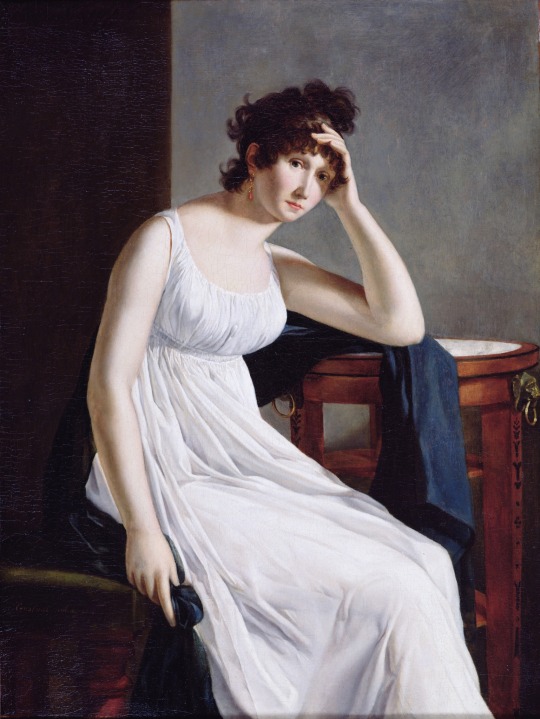
Self-portrait, 1801
#napoleonic era#empire period#female artist#women artists#female artists#women artist#female painter#women’s art#women#19th century#1800s#1800s art#19th century art#1810s#first french empire#french empire#the consulate and empire#napoleonic#French#France#woman#female#art#fashion#painting#portrait#empire#empire style#empire fashion#french art
96 notes
·
View notes
Text
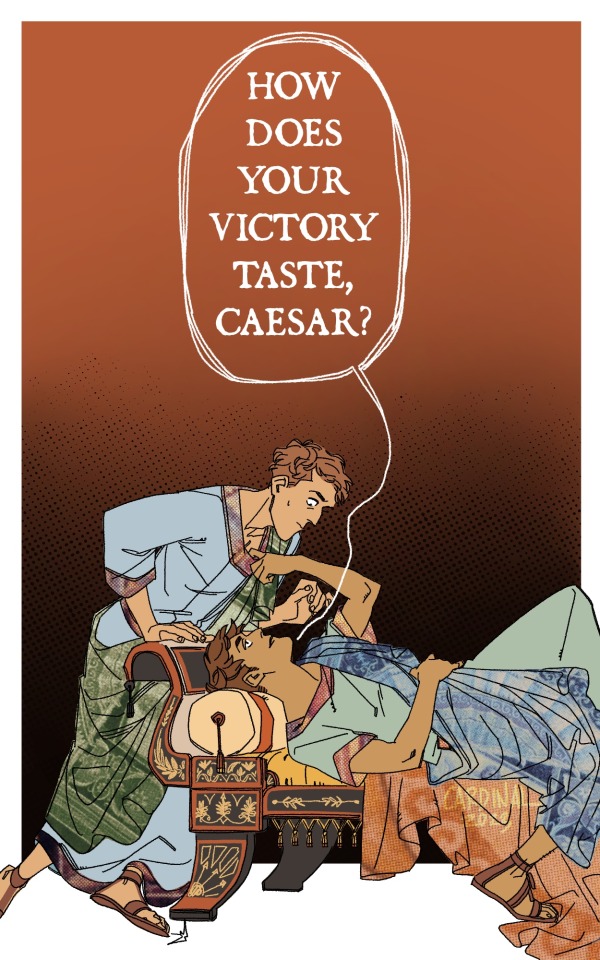
CAESAR AUGUSTUS AND MARCUS LICINIUS CRASSUS
this is about the spolia opima that crassus was robbed of lmao. like, yeah okay octavian could've asked him not to claim it, but nevertheless. a kind of theft happened there.
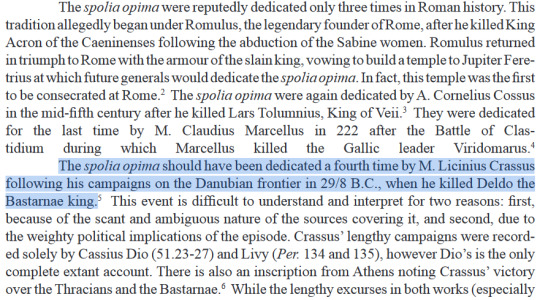
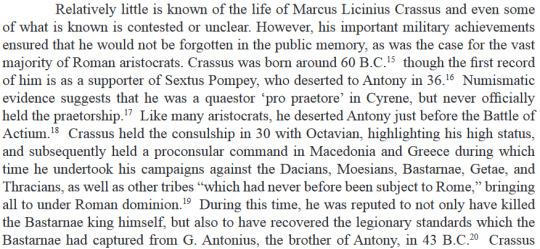


Fact and Fiction: Crassus, Augustus, and the Spolia Opima, Catherine McPherson
#this is one from the vaults I started a few months ago and finally finished. it’s always the furniture details that put things on hold lmao#the former co consuls are fightinggggg (?)#rome is built on top of other people. this is about both the imperialism-slavery machine and the way that all these guys would#politically devour their own generation to sit on a throne. etc. anyway. octavian specifically sits on a throne of other people’s#accomplishments. that’s a specific kind of debt to carry around your neck. or theft depending on who is doing what#this was theft. anything involving Agrippa was a gift so there’s an obligation to succeed which is it’s own kind of currency so to speak#sugghrhfh. every crassus always has to be like this. in my heart i always root for whoever decides to go up against rome#and then i'm stuck with the guy who should've got a spolia opima like. congrats on your win. i guess. i think. RIP.#ACTUALLY YOU KNOW WHAT. while im talking about this crassus. domina fucking sucks. what an absolute clusterfuck of a show#anyway. if anyone ever does augustan age politics again. octavia would be a great character if you want to invent shit#but also more importantly octavian should seduce crassus for this. thank you.#octavian#marcus licinius crassus.....christ how do i write down that he's the grandson of my crassus. i'll figure it out later#roman empire tag#drawing tag
336 notes
·
View notes
Text
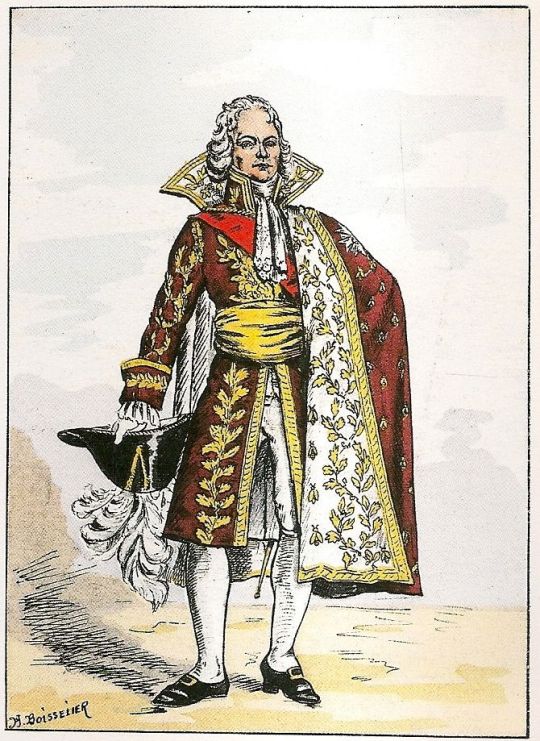

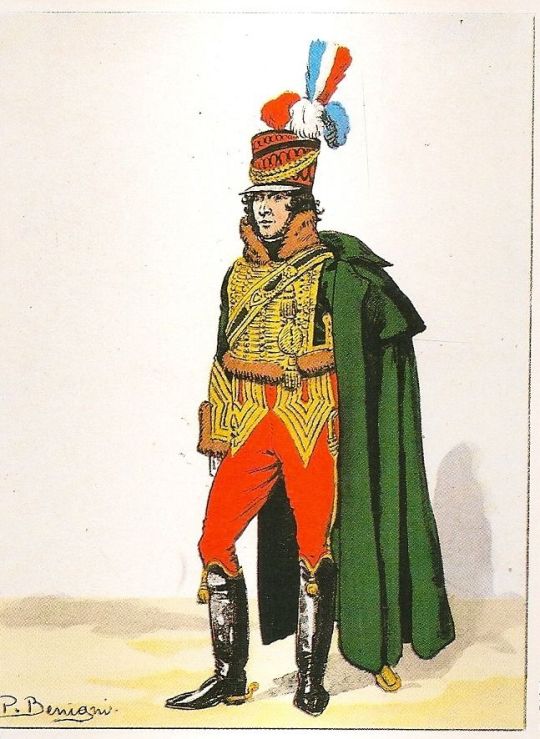
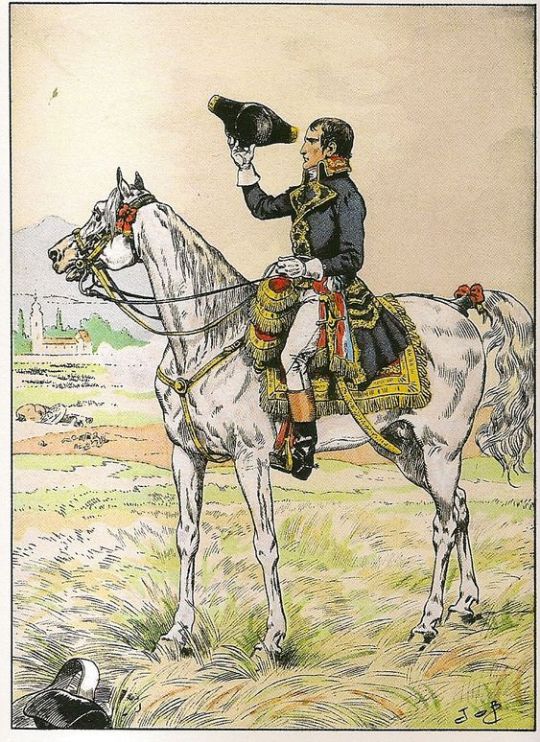
Clockwise from Left: Talleyrand, Eugene de Beauharnais, Murat, Napoleon.
These are all on pinterest. if you click on this link you will see a lot more of them.
20 notes
·
View notes
Text

Referred to as the ‘Côtes de Melon’, after the distinctive pommel shaped like the ‘ribs of the melon’. This sabre style gained popularity among French officers from about 1800 and remained in use until the introduction of the model 1821 infantry and 1822 cavalry sabres during the Restoration era.

Aside from the pommel, the type is distinguished by the simple stirrup hilt with langets and a single quillion. The grips are made from hardwood and can be checkered or have longitudinal groves. Often the knuckle guard has a stylised olive decorative feature. Swords belonging to superior officers would have been silver-plated.
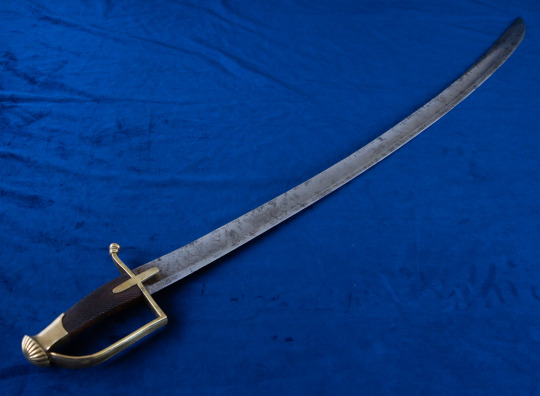

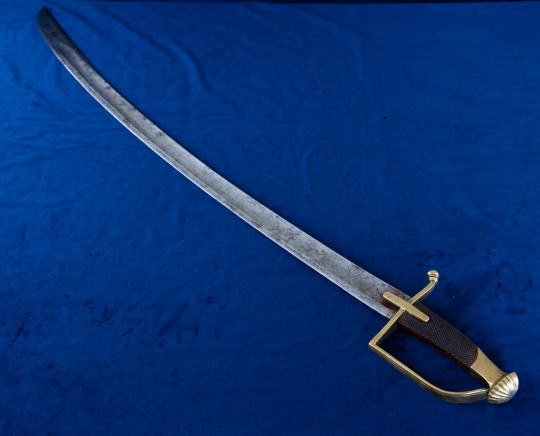
The swords of mounted or cavalry officers can be identified by their length and dual suspension rings on the scabbard. Superior officers typically had ornate metal scabbards, while infantry officers preferred shorter sabres with a frog stud for use with the cross-belt.
An officer of one of the light cavalry regiments most likely owned this sabre. The blade is particularly large and sturdy, plus the scabbard has dual suspension rings. The blade is decorated in the typical oriental fashion of the late 18th Century with faux Islamic / cabalistic script and an ‘Ottoman’s head’. There is a lovely Solingen rose on the blade's spine but no other identifying manufacturer's marks.
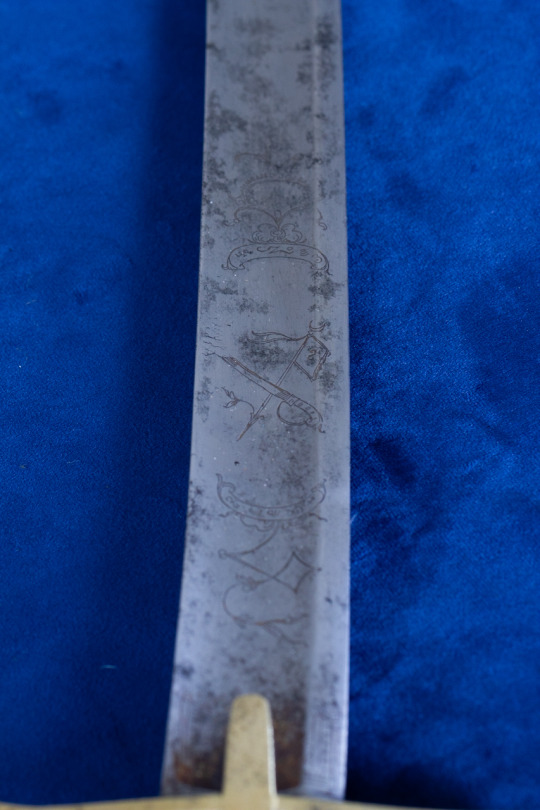

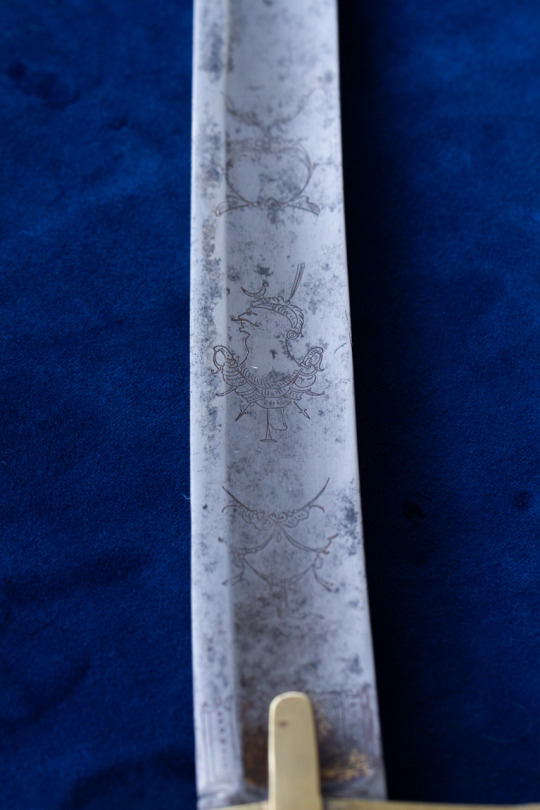
The simple ‘baguette’ shaped langets, blade decorations and plain knuckle guard may indicate that this is an early example of the type, or that it was used by an officer of another nation, imitating French fashion.

Overall Length: 965 mm
Blade Length: 825 mm
Grip Length: 130 mm
Inside Grip Length: 110 mm
Sword Weight: 800 grams
Total Weight: 1050 grams
Point of Balance: 180 mm
Curve: 37 mm
#Sword#Sabre#côtes de melon#French#French Army#French Cavalry#Napoleonic Wars#Consulate era#First Empire#Antiques#Military Antiques#Cavalry Swords#Light Cavalry
83 notes
·
View notes
Text
.
#The funniest thing abt my job is that I am now an expert re the most obscure border and law changes in Europe 1918-1990#Did you know that the Saarland had a quite liberal citizenship law in the years of its existence as an independent state 1948-1956#which means formerly stateless Jewish Saarländer and their descendants are sometimes Germans without knowing it#did you know what a headache the whole Danziger Korridor thing Was?#Also Danzig had its own citizenship 1920-1939 BUT Poland hated this and since Danzig had no foreign consulates#these matters were handled by Poland for Danzigers abroad... except Polish consulates usually just handed them Polish passports#Also all of the formerly Russian empire Jews who lived abroad when that fell apart just... did whatever they wanted#I've seen one guy who was listed as simultaneously Polish and stateless who somehow talked a small Austrian village#into giving him a passport because his last residence within kuk borders was Vienna#I know ppl on here know but... national identity and citizenship and so on is so incredibly made up
8 notes
·
View notes
Note
Re: roman empire.
I think some confusion comes from definitions. The roman republic was an empire in that it was expanding its borders and colonializing other countries.
But there wasn't An Emperor in charge. You had the 2 Consuls who'd be co-rulers and had veto powers over each other. Sometimes you'd have powerful aliances, often you'd have intrigue
The title 'Imperator' used to be for the person in charge of the military. Like, 'commander', the guy who gives commands.
Which led to some conflicts when the person in charge of the military wasn't also in charge of politics, but wanted to be.
That title got folded into the Dictator For Life position that Gaius Julius established, which is considered one of the main reasons he was murdered.
So, empire, but for a while nobody called 'emperator' in charge.
Thank you for the info, genuinely!
As i also replied on that post, I should learn not to reblog things with long tags when Im only half awake- I was primarily reacting to the idea that killing Ceasar was in any way an anti-imperialist action, considering that the guy who came after him, his adoptive son, was the ''first Emperor'' of Rome, even though it was already an empire, just without one head guy in charge.
but its nice to have a short overview of the timeline nonetheless ^^
#i know i know about the roman empire 😭😭#'alea iacta est' et cetera et cetera#kingdom then republic with two consuls then emperor-lead state with a senate iirc#triumverate > Augustus > pax romana#ask#i wont pretend to be an expert#but i know a decent amount#still everyone is very kindly explaining it to me so i dont wanna be rude. tis mostly miscommunication from my end#joos yaps#babtest
7 notes
·
View notes
Photo
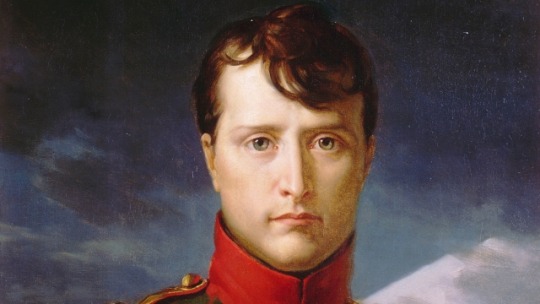
2 août 1802 : Bonaparte est nommé consul à vie ➽ https://bit.ly/37F8TaA En exerçant le consulat, Bonaparte faisait l’empire. Faisant marcher de front trois grands projets, qui tendaient au même but, il voulut constituer le clergé, qui n’avait encore qu’une existence religieuse ; créer un ordre militaire, permanent dans l’armée ; rendre son propre pouvoir, d’abord viager, ensuite héréditaire
#CeJourLà#2Août#Bonaparte#Consul#Consulat#Empire#politique#pouvoir#règne#histoire#france#history#passé#past#français#french#news#événement#newsfromthepast
4 notes
·
View notes
Photo
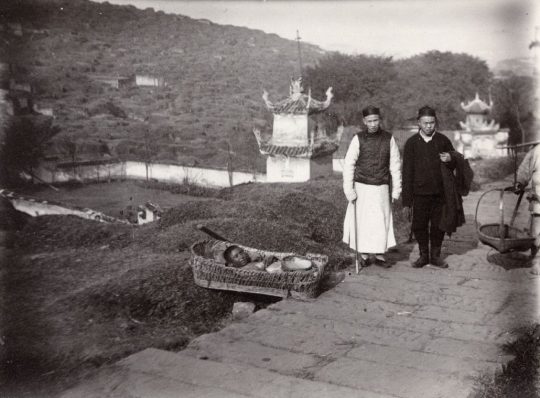
Fritz and Hedwig Weiss, German consul and his wife, take a photograph during a walk on the path along the city wall, Chongqing. c. 1912. Source.
#chongqing#重庆#city walls#black and white photograph#qing china#qing empire#end of the qing#republican china#xinhai revolution#german consul#imperial germany#black and white photography
1 note
·
View note
Text

On february 25 2024, Aaron Bushnell, a 25 year old active duty member of the US military, seif-immolated outside the Zionist embassy in Washington, D.C. Aaron lit himself ablaze in protest of the United States' ongoing complicity in the genocide on Gaza. In making the most extreme sacrifice a human being can in support of a moral cause - his own life Aaron sent a message on behalf of the masses of the US and of the world, that people of conscience everywhere will refuse complicity in the unfolding genocide against the Palestinian people until our last breath.
While US media is already spinning the story as one of a mentally ill, troubled youth, Aaron's own message in the seconds prior to his act demonstrate the moral clarity and foresight with which he pondered and ultimately decided upon his act. Aaron is now the second person to self-immolate in protest of the US-backed genocide on Gaza, the first being a woman in Atlanta who lit herself on fire outside the Zionist consulate in Atlanta, Georgia.
There is perhaps no metaphor more powerful for USempire than the response of police at the scene. Instead of running to put out the flames with fire extinguishers and save Aaron's life, cops drew their weapons and pointed them directly at Aaron as he stood burning to death. What threat did the police see in a young man on fire, incapable of doing anything but shouting "Free Palestine" until the pain prevented him from shouting any longer? They saw something alien to them, alien to the logic and machinery of US empire: self-sacrifice for a cause greater than one's own life. The word for martyr in Arabic, "shaheed," translates to "witness," or one whose final moment in life is as a witness to injustice. Aaron Bushnell is a martyr, whose final moment was spent in the heat of one naked, unflinching truth: the moral conscience of every human being, from the belly of the beast to the farthest reaches of the Earth, demands immediate attention and action to end the horrors before us. Let Aaron's words and last act burn brightly in our conscience, let it propel us, let it move us to continue struggling for a Free Palestine, now and until the hour of liberation.
source: palestinianyouthmovement on Instagram
#free palestine 🇵🇸#from river to sea palestine will be free#free rafah#save rafah#gaza under genocide#gaza under fire#ceasefire#rafah#we stand with palestine#palestine genocide
548 notes
·
View notes
Text
OKAY HEAR ME OUT:
All of these edgy science fiction / fantasy novels about overthrowing evil empires and then becoming the very thing that you sought to destroy and the main character ending up as bad as the regime they overthrew and all that, you know?
You could very easily make a dramatised version of the life of Napoleon Bonaparte, transplant it into generic fantasy evil empire world, change the names of the historical figures to fictional names, and all the tumblrinas would eat that up.
Picture this: Napoleon Our protagonist is born the second child in a large family on Corsica generic fantasy island, is sent to a military academy in France evil empire, and begins to rise through the ranks of the army. A revolution occurs, in which the French evil empire monarchy is overthrown, and our protagonist, a supporter of the revolution, fights for the revolutionary government against royalist uprisings and the first coalition other evil empires. Along the way, our protagonist becomes increasingly powerful, as well as being an absolute slut. After a series of military campaigns, our protagonist, seeing the corruption of the directory new evil government, stages a coup and becomes first consul generic fantasy leader. However, over the course of the book, our protagonist has acquired a huge ego and lost many morals, and ends up themself the emperor of France fantasy kingdom. "Morally grey" shenanigans ensue. (Of course, our protagonist would have many many love interests, such as Josephine de Beauharnais hot milf, Jean-Andoche Junot hot best friend, and Tsar Alexander I enemies-to-lovers-to-enemies-again.) (Main character would be characterised as being the most pathetic little person to ever exist who is frequently bullied for being quirky and not-like-other-girls)
#THIS POST IS 100% SILLY OKAY PLEASE DON'T TAKE ANYTHING I SAY SERIOUSLY#history#napoleon#napoleonic#napoleonic era#napoleon bonaparte#books#bookblr#fantasy#fantasy books#fantasy writing#writing#writeblr#literature#locked tomb#iron widow#baru cormorant#i'm sorry for this
714 notes
·
View notes
Text
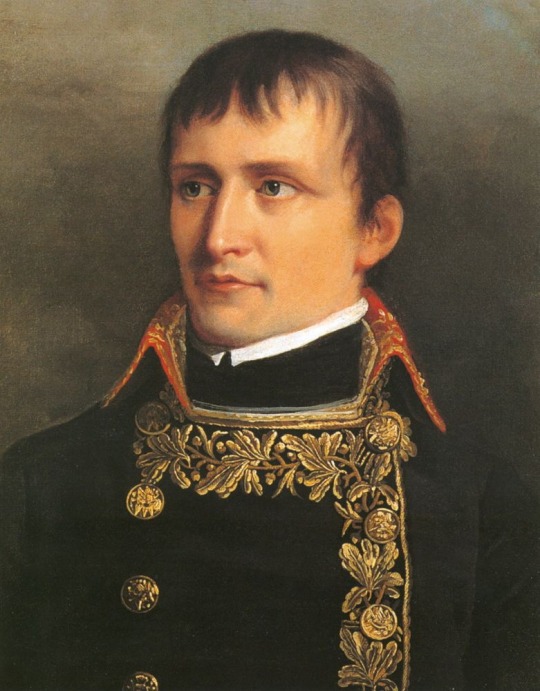
Portrait of Napoleon Bonaparte, circa 1802
Robert Lefèvre (1755-1830), French
#Napoleon#napoleon bonaparte#painting#portrait#Robert Lefèvre#French#art#the consulate and empire#the consulate#1st consul#consul#napoleonic era#frev#French empire#first French empire#french revolution#first french republic#19th century#1800s#1800s art#pretty#napoleonic#men’s fashion#Bonaparte#empire style#france#French history#history#neoclassical#neoclassicism
28 notes
·
View notes
Text
Times Caligula was probably fucking with people
I have a pet theory that at least some of Caligula's "madness" was really him being a huge troll and screwing with people, and that several incidents the ancient historians take seriously were shitty jokes taken out of context. From Suetonius, Gaius:
Wandering into emperor Tiberius' bedroom at night with a dagger, thinking, "Eh..." and wandering back out. (12)
Chucking money into crowds to make people scramble for it. (18, 26)
Telling people "I'm gonna fuck the moon." (22)
Getting into arguments with a statue of Jupiter. (22)
Constantly pranking his uncle Claudius. (23)
[Caligula's daughter violently attacks her playmates] Caligula: "Yep, she's definitely mine." (25)
Promising an exciting gladiator show and then swapping in old shitty fighters at the last second. (26)
Reminding people "I could kill you whenever I like." (29, 32)
Grumbling about how the empire was too peaceful and there was nothing heroic left for him to do. (31)
"Everyone reads Homer. I should ban him and see what happens." (34)
Leading an army to the coast, making them gather seashells as "spoils of war," then telling them "Treat yourselves!" on the tiny monetary bonus he awarded them. (46)
Practicing goofy faces in his mirror to freak people out. (50)
Invites three terrified senators to the palace in the dead of night. Jumps out from behind a curtain and does a song and dance number in drag. Refuses to explain. Leaves. (54)
Does not actually make his horse consul, but pampers it so much people said he wanted to. (55)
Taunts the praetorian guards with so many "sissy" jokes they get fed up and shank him. (56, 58)
When people heard he was dead they thought he was pulling a stunt. (60)
#i left out the really dark/gory stuff. reader beware if you look these up!#also take everything suetonius says with a truckload of salt. many of these stories are probably false#still funny tho#suetonius#caligula#jlrrt reads#jlrrt essays#the twelve caesars is a comedy
349 notes
·
View notes
Note
Can you explain the Iran-Israel situation please?
Alright, let's get to it. Please note that I'm writing this on mobile during my lunch break, so I can't include reference/source links as much as I'd like. Thankfully, most of what I'm going to be telling you should be easily located by searching for an article on one of the following: APNews, Reuters, BBC Global News Podcast, Democracy Now!, NPR, or The New York Times. Long-term background is probably best found in videos by the YouTube channels Real Life Lore or tldr global news, or on Wikipedia if you prefer text.
The short version: Israel attacked Iran's consulate in Syria to get at some of the military commanders that were there, which is legally equivalent to attacking Iran itself. Iran responded by sending about 300 bombs at Israel, most of which were shot down in transit. Given that they still called it a success, even though it seems only one person was even hurt, my understanding is that it's very likely that they only intended the rockets to be a show of force, rather than an actual escalation, because Iran can't afford a war right now.
To support my blogging so I can move out of my parents’ house, I do have a ko-fi. Alternately, you can donate to one of the charities I list in this post OR this post.
The long version:
Okay, let's start with some background on Israel, then Iran. This is... a lot, so if you already know the broad strokes skip down to 2023.
Israel was established following WWII by the English and French, following borders the two countries had secretly drawn up decades earlier in the Sykes-Picot agreement. The intent was to give the Jewish people a place to go... or, depending on who you ask, a place to send them. Their ancestral homeland was viewed as the best choice, sort of like a deportation millennia after a diaspora. Given that WWII had just ended by the time Sykes-Picot was actually put into effect, 'getting out of Europe' was something a lot of Jews were given to agree with.
The Arab world was not happy, as that land had belonged to the Ottomans for centuries, and had long since 'naturalized' to being Arab. I'm not going to pretend to know the nuances to when people do or do not consider Palestine to have been its own nation; it was an Ottoman state until WWI, at which point it came under British control for just under three decades, and that period is known as the British Mandate of Palestine; it ended after WWII, with the creation of Israel. Palestine's land and people have sort of just been punted around from one colonizer to another for centuries.
Iran is the current form of what was once Persia. They were an empire for a very long time, and were a unitary monarchy up until the early 20th century; in 1925, Iran elected a Prime Minister who was then declared the monarch. The following several decades had Iran's monarchy slowly weakened, and occasionally beset by foreign interventions, including a covert coup by the US and UK in 1953. The country also became more corrupt throughout the 1970s due to economic policy failing to control inflation in the face of rising oil prices.
In 1979, there was a revolution that overthrew the monarchy and the elected government, replacing the system with a theocracy and declaring Iran to be an Islamic Republic, with the head of state being a religious authority, rather than an elected one. This was not popular with... most countries. 1980 saw the closure of all universities (reopened in 1983 with government-approved curriculums), as well as the taking of over fifty American hostages from the US Embassy in Iran. You may have heard about that in the context of Ronald Reagan encouraging Iran to keep the hostages until the end of Carter's term in order to force the election.
So, the West didn't like having an Islamic state because it claims to like democracy, and also because the Islamic state was explicitly anti-American and this has some Bad Effects on oil prices. The Soviets didn't like having an Islamic State because a theocracy goes directly against a lot of communist values (or at least the values they claim to have), and weakened any influence their supposedly secular union could have on Iran and the wider middle east. The other countries in the Arab world, many of them still monarchies, didn't like the Islamic republic because if the revolution spread, then it was possible their monarchies would be overthrown as well.
(Except Oman, which is not worried, but that's the exception, not the rule.)
This is not a baseless worry, because Iran has stated that this is its goal for the Arab world. Overthrow the monarchies, overthrow the elected governments, Islamic Rule for everyone. That is the purpose of its proxies, like Hezbollah (Lebanon), the Houthis (Yemen), and Hamas (Palestine), along with less well-known groups like the Salafi Jihadists in Mali, who are formally under the umbrella of al-Quaeda, which Iran denies having any relation to but is suspected of funding. In areas where these proxy groups have gained power, they are liable to enact hard Shari'a law such as has happened in Northern Mali and other parts of the Sahel region.
While other conflicts have occurred in these countries, I think the above is most relevant.
Israel has repeatedly attacked, or been attacked by, other nations in the middle east, as they are viewed as having taken over land that is not theirs, and as being a puppet of the US government. The biggest conflicts have been 1947-1948, 1968/1973, and 2014.
And then, of course, 2023.
Now, Iran, more than any other nation in the Middle East, hates Israel. They have for a very long time, viewing them as an affront to the goal of spreading Islam across the whole of the middle east, and as being a front and a staging ground for the United States and other Western powers. Two common refrains in the slogans of Iran and its proxies are "Death to America" and "Death to Israel."
Due to Iran's military power and virulence towards Israel, the United States has been funneling money to Israel for decades. It has more generally been to defend itself against the Arab world at large, but it has narrowed over the decades to being about Iran and its proxies as relations have normalized with other nations like Egypt and Saudi Arabia.
Cue October 7th, 2023. Hamas invades Israeli towns, kills some people, and takes others as hostage. Israel retaliates, and the conflict ramps up into what is by now tens of thousands of dead, some half of which are children.
In this time, Hamas's allies are, by definition, Iran and the other proxy forces. Hezbollah, being in Lebanon, share a border with Israel's north. They have been trading rocket fire across the border in waves for most of the past six months. The Houthis, down in Yemen, claim to be attacking the passing cargo ships in order to support Palestine. Given that the attacks often seem indiscriminate, and that the Houthi's control over their portion of Yemen is waning in the face of their poor governance, this is... debatable. It's their official reason, but given that "let's attack passing ships, claiming that we only attack Israeli or American ships and that it is to support Palestine" is rallying support domestically for their regime, it does seem to be more of a political move to garner support at home than about supporting Palestine.
Iran, however, has not attacked Israel. They've spoken out about it, yes, but they haven't done anything because nobody wants a regional war. Nobody can afford it right now. Iran is dealing with a domestic crisis due to oil subsidies bleeding the states' coffers dry, and the aging Ayatollah Ali Khamenei, the leader of Iran, refusing to pick a successor. They are looking at both an economic crisis and succession crisis, and a regional war would fuck up both situations further. Iran funds most of its proxies, and they can't do that, and fight a war on top of it, while their economy is in its current state. Pure self preservation says they don't want a war, especially with the ongoing unrest that's been going on for... well, basically since the revolution, but especially since the death of Mahsa Amini.
Meanwhile, in Israel, Netanyahu has been looking at corruption charges and legal issues since before the Hamas attack. It's generally agreed that if Israel were to hold new elections right now, he would lose and be replaced, and also immediately taken to court. Netanyahu wants to stay in power, and as long as the war on Hamas lasts, he is unlikely to get voted out. A change in leadership in the middle of a war is rarely a good idea for any country, and he's banking on that.
However, the war on Hamas rests on the shoulders of American money and supplies. Without that military support, Israel cannot fight this war, and America... is losing patience.
Officially, America and most of the western world have been telling Israel to not fucking escalate for the majority of the war.
There have been implied threats, more or less since Schumer's big speech about how Israel needs a new election, of American legislators putting conditions on any future aid. There have even been rumblings of aid being retracted entirely if Israel follows through on invading Raffah.
So...
American aid to Israel has, for a very long time, been given in the name of defending Israel against Iran and its proxies.
Israel has been fighting this war against Hamas for six months, killing what is by now innumerable civilians, on the power of US military aid.
Netanyahu benefits from the continued war due to domestic troubles.
Iran does not want a regional war, or really any big war, due to its own domestic troubles.
The US is, in theory, losing patience with Israel and threatening to pull the plug on unconditional support. It's very "we gave you this to fight Iran. Stop attacking civilians. If you keep attacking civilians, then you're going to have to rely on what we already gave you to fight off Iran so that you won't keep wasting it on civilians."
Israel... attacks Iran, prompting a response, and is now talking about escalating with Iran.
I am not explicitly saying that it looks to me like Israel, which is already fighting a war on two physical fronts and even more political/economic ones, has picked a fight with Iran so that America feels less like it is able to withdraw support.
I just... am finding it hard to understand why Israel, which is in fact fighting both Hamas and Hezbollah, would attack the Iranian consulate in Syria otherwise. They can't actually afford to fight this war, escalating to a full regional conflict, on a third front.
Not without pressuring American into keeping the faucet of military funding open at full blast.
To support my blogging so I can move out of my parents’ house, I do have a ko-fi. Alternately, you can donate to one of the charities I list in this post OR this post.
#phoenix politics#current events#iran#israel#hamas#houthis#hezbollah#syria#politics#united states#military funding#military aid
91 notes
·
View notes
Text
Claudius: The fool of the dynasty.
Claudius was born in Lugdunum, Gaul on August 1, 10 BC. On his mother's side, he was the grandson of the legendary Mark Antony and great-nephew of emperor Augustus. His father was the son of the Empress Livia and brother of the later Emperor Tiberius. He had blood ties with Julius Caesar.
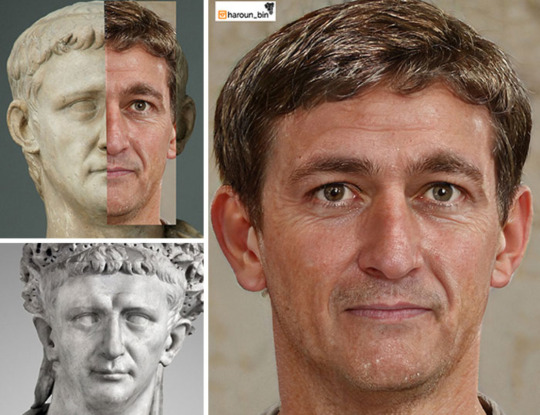
According to historical sources: His sister, Livilla, after hearing an Augur say that her younger brother would be emperor, exclaimed: "May the gods save Rome from such misfortune. That would be the end of the empire." His grandmother, Livia, avoided talking to him because "when he was a child, the empress felt uncomfortable seeing and hearing him." During his childhood, the family avoided taking him to public events so as not to be seen. All this drama just because Claudius was lame, stuttered and had a tic.
During the reigns of Augustus and Tiberius, that is, for almost his entire life, he was prohibited from holding public office because of his "defects." From a very young age it was determined that he could never be heir to the throne. This was determined by his family but not by his destiny.
Three wives, three troubles.


Year 9: The Empress Livia convinced a senator who was a close friend of her family, to marry her daughter, Plautia Urgulanilla, to her 18-year-old grandson. They had a son, Claudius Drusus, who died at 14-15 years old when he threw a piece of pear into the air to catch it in his mouth and the piece got stuck in his throat. Years before the son's death, a girl was born. But months later, Claudius noticed that the baby looked more like one of his freedmen than him. Claudius publicly declared that the girl was not his daughter. This scandal occurred at the same time that her brother-in-law, Plautia's brother, murdered her wife by throwing her out of a window. After this, Claudius immediately divorced.
Year 28: The prefect of the Praetorian Guard, Sejanus, was plotting to occupy the throne. Knowing that no one would accept an emperor who was not related to the dynasty, he married his sister, Elia Paetina, to Claudius. They had a daughter named Antonia. In the year 31 the plots and murders of Sejanus were discovered; Emperor Tiberius sentenced him to death. Claudius was forced to divorce the relative of the traitor but he never abandoned his daughter Antonia.
Year 38: During the reign of his nephew Caligula, Claudius married a woman member of the dynasty. The young and beautiful Valeria Messalina was the granddaughter of Antonia the Elder, Claudius's aunt. Antonia the Elder was the first daughter that Mark Antony had with Augustus's sister. Ten years later, this third marriage will end in worse circumstances than the first two.
Interestingly, the “mad" emperor Caligula was the first to recognize that Claudius had the skills to hold an important position. Claudius at 46 years old had the well-deserved important office thanks to his nephew. He was appointed consul.
The less thought day
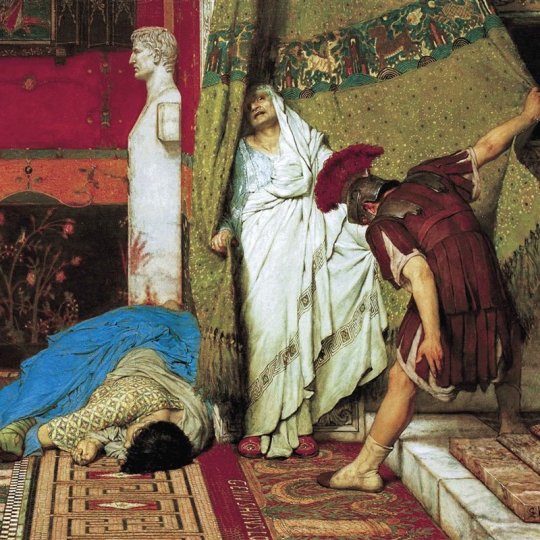
On January 24, 41, the emperor was assassinated by the Praetorian Guard in collusion with several senators. Minutes later, the emperor's wife and daughter were also murdered.
And what no one would have thought possible happened: At the age of 50 Claudius became Caesar. The fourth emperor of Rome.
According to the historians Flavius Josephus and Cassius Dion, Claudius, terrified, thinking that the senators' plan was to exterminate all the members of the imperial family to restore the republic, hid behind a curtain. A Praetorian soldier found him and immediately proclaimed him emperor because he was the only male in the dynasty who could rule, the other remaining member being his 3-year-old grandnephew Lucio Domitius, whom 9 years later Claudio himself would give the famous name Nero.
Claudius the Conquer

Claudius surprised Rome by proving to be not only an intelligent emperor but also a conqueror who would make the empire greater. In 43, Claudius begins the campaign to conquer Britannia. Circa 50 the Romans founded the city Londinium /London.
Although this was his most famous conquest and territorial expansion, it was not the only one. Noricum: Present-day central Austria (west of Vienna), part of Bavaria (Germany), northeastern Slovenia, and part of the Italian Alps. Thrace (Bulgaria), and he made the Danube River a new border of the Roman Empire.
Claudius the Emperor
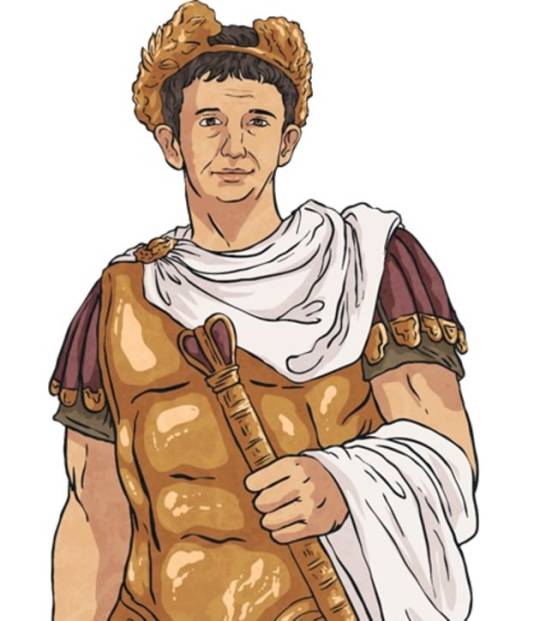
He distinguished himself for his policy of Meritocracy. He rewarded for ability , not for personal sympathies. He allowed men from of non-aristocratic origin access to the Senate. Claudius gained the respect of the Senate, the army and the people at the same time, something that had not been seen in Rome since the time of Augustus.
He had two children with his third wife: Octavia, born late year 39, and Tiberius Claudius, later nicknamed Britanicus due the conquest of Britannia, born 19 days after Claudius' accession to the throne.
He wrote many works, most during the reign of Tiberius. In addition to a history of the reign of Augustus and some treatises on the game of dice, his great passion, among his main works are a History of Etruscan civilization in twenty books, a History of Carthage in eight volumes, and a dictionary of the Etruscan language.
Pliny the Elder refers to Claudius as "One of the best writers". Evidently, Claudius learned a lot from his teacher, the most prestigious Roman historian, Titus Livius (Livy), author of the extraordinary work Ab Urbe Condita.
In the year 47 Claudius celebrated the Ludi Saeculares of the eighth centenary of the founding of Rome.
The tragic end of the empress.
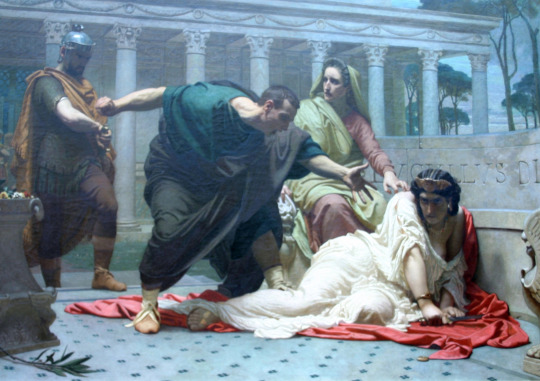
Empress Valeria Messalina becomes the lover of Senator Gaius Silius. Taking advantage of her lineage as a woman of the Julius Claudia dynasty, she convinced that man that together they could take the throne from Claudius. In 48, while Claudius was in Ostia, Messalina divorced him and married Silius. Three freedmen arrived in Ostia to give the incredible news to the emperor.
According to Tacitus: <<Claudius, having returned to the palace, ordered that Messalina be brought to him, but the freedman Narcissus, fearing that the emperor would forgive her, ordered a freedman, a centurion, and some tribunes to proceed with the execution. The woman was overtaken in the gardens and executed; informed of his wife's death while he was at the table, Claudio would not have asked any more questions. >>
The senator and his group of accomplices and supporters were also executed.
Seven years earlier: Claudius ordered the return of his nieces, daughters of his deceased brother Germanicus:, Livilla and Agrippina the Younger, both exiled by Caligula in 39. Livilla was highly favored by Claudius, and Agrippina the Younger was ver loved by the people. This situation caused Messalina worry and jealousy.
Messalina, through intrigue, in a very short time managed to send Livilla back into exile, along with the philosopher Seneca -a close friend and ally of Agrippina the Younger- accusing them of being lovers and conspiring. Livilla died in exile months later.
But Mesalina could not make Agrippina the Younger disappear, who was extremely cunning and more dangerous than Livilla because she had a son, that is, a candidate for the throne who, to make matters worse, was older than Messalina's son. In all likelihood, this could be the reason Messalina attempted to overthrow Claudius.
The fourth wife, and the death.

If Senator Gaius Silius was able to use Messalina's lineage to try to overthrow Claudius by marrying her, what could another do who marries the widow Agrippina, a direct descendant of Divine Augustus? This was the reason for Claudio's incredible decision to marry his niece: simply so that no other man could marry her. Agrippina immediately accepted the proposal to become empress of Rome.
The marriage between an uncle and his niece was considered incest and a crime in Rome. However, this was not an incestuous relationship but a political union. Even so, dispensations had to be presented to the Senate and religious authorities, and there were endless ceremonies.
Finally, in the year 49, in an unprecedented event in Roman history, the Emperor married his own niece. Immediately she gets Claudius to bring her close friend Seneca from exile. Agrippina appoints Seneca as her son's tutor and teacher. Claudius granted Agrippina the title of Augusta. Curiously, he did not grant that title to empress Messalina when they both ascended the throne, but to his deceased mother Antonia the Younger.
In 50 Claudius adopted his great-nephew Lucius as son and changed his name to Nero Claudius. Agrippina's son become the main heir to the throne, instead Emperor's own son. No historian can understand why Claudius made that strange decision; Definitely it was not due to the age of the heirs, since Britannicus had 9 years old and Nero 12 so he was not much mature than Britannicus.
Later, Agrippina convinces Claudius to marry his daughter Octavia to Nero. At that time Nero and Octavia are around 14 and 12 years old respectively.
In 54, October 13, at age 64, the emperor died suddenly during a banquet, after having eaten mushrooms, according to Juvenal's version.
There are several versions about his death, however they all agree on the theory that the emperor was poisoned. Personally, I want to believe that his death was due to natural causes.
Below, a text that is not mine but from a very important site with an extensive article on the death of Emperor Claudius. I copy and paste the final part that I was happy to read.

However, as Levick points out, those present at the banquet do not seem to have suspected poisoning of any sort; moreover, the eunuch Halotus, whose job was to taste the Emperor's food, kept his job when Nero assumed the throne—evidence that nobody wanted to put him out of the way, either as an accomplice or as a witness to assassination.
We see no reason to believe that Claudius was murdered. All the features are consistent with sudden death from cerebrovascular disease, which was common in Roman times. Towards the end of 52 AD, at the age of 62, Claudius had a serious illness and spoke of approaching death. Around that time there were changes in his depiction in busts, cameos and coins—with thick neck, narrow shoulders and flat chest. The Apocolocyntosis, addressed to an audience some of whom were present at the death, makes clear that there is no need to postulate poisoning, accidental or otherwise.
Text : © 2002, The Royal Society of Medicine.
The Divine Claudius

Sculpture of Claudius deified (1st Century) Vatican Museums.
After his death, like Augustus, he was deified.
The boy who was said to never achieve anything not only became an one of the best writers of Rome, emperor and conqueror but also a god.
164 notes
·
View notes
Text
[A]nti-homeless laws [...] rooted in European anti-vagrancy laws were adapted across parts of the Japanese empire [...] at the turn of the 20th century. [...] [C]riminalising ideas transferred from anti-vagrancy statutes into [contemporary] welfare systems. [...] [W]elfare and border control systems - substantively shaped by imperial aversions to racialised ideas of uncivilised vagrants - mutually served as a transnational legal architecture [...] [leading to] [t]oday's modern divides between homeless persons, migrants, and refugees [...].
---
By the Boer Wars (1880–1902), Euro-American powers and settler-colonial governments professed anxieties about White degeneration and the so-called “Yellow Peril” alongside other existential threats to White supremacy [...]. Japan [...] validated the creation of transnational racial hierarchies as it sought to elevate its own global standing [...]. [O]ne key legal instrument for achieving such racialised orders was the vagrancy concept, rooted in vagrancy laws that originated in Europe and proliferated globally through imperial-colonial conquest [...].
[A]nti-vagrancy regulation [...] shaped public thinking around homelessness [...]. Such laws were applied as a “criminal making device” (Kimber 2013:544) and "catch-all detention rationale" (Agee 2018:1659) targeting persons deemed threats for their supposedly transgressive or "wayward interiority" (Nicolazzo 2014:339) measured against raced, gendered, ableist, and classed norms [...]. Through the mid-20th century, vagrancy laws were aggressively used to control migration [and] encourage labour [...]. As vagrancy laws fell out of favour, [...] a "vagrancy concept" nonetheless thrived in welfare systems that similarly meted out punishment for ostensible vagrant-like qualities [...], [which] helps explain why particular discourses about the mobile poor have persisted to date [...].
---
During high imperialism (1870–1914), European, American, and Japanese empires expanded rapidly, aided by technologies like steam and electricity. The Boer Wars and Japan's ascent to Great Power status each profoundly influenced trans-imperial dynamics, hardening Euro-American concerns regarding a perceived deterioration of the White race. [...] Through the 1870s [...] the [Japanese] government introduced modern police forces and a centralised koseki register to monitor spatial movement. The koseki register, which recorded geographic origins, also served as a tool for marking racialised groups including Ainu, Burakumin, Chinese, [...] and Korean subjects across Japan's empire [...]. The 1880 Penal Code contained Japan's first anti-vagrancy statute, based on French models [...]. Tokyo's Governor Matsuda, known for introducing geographic segregation of the rich and poor, expressed concern around 1882 for kichinyado (daily lodgings), which he identified as “den[s] for people without fixed employment or [koseki] registration” [...].
Attention to “vagrant foreigners” (furō-gaikokujin) emerged in Japanese media and politics in the mid-1890s. It stemmed directly from contemporary British debates over immigration restrictions targeting predominantly Jewish “destitute aliens” [...].
The 1896 Landing Regulation for Qing Nationals barred entry of “people without fixed employment” and “Chinese labourers” [...], justified as essential "for maintaining public peace and morals" in legal documents [...]. Notably, prohibitions against Chinese labourers were repeatedly modified at the British consulate's behest through 1899 to ensure more workers for [the British-affiliated plantation] tea industry. [...]
---
Simultaneously, new welfaristic measures emerged alongside such punitive anti-vagrancy statutes. [...] Such border control regulations were eventually standardised in Japan's first immigration law, the 1918 Foreigners’ Entry Order. [...] This turn towards instituting racialised territorial boundaries should be understood in light of empire's concurrent welfarist turn [...]. Japanese administration established a quasi-carceral workhouse system in 1906 [in colonized territory of East Asia] [...] which sentenced [...] vagrants to years in workhouses. This law still treated vagrancy as illegal, but touted its remedy of compulsory labour as welfaristic. [...] This welfarist tum led to a proliferation of state-run programmes [...] connecting [lower classes] to employment. Therein, the vagrancy concept became operative in sorting between subjects deemed deserving, or undeserving, of aid. Effectively, surveillance practices in welfare systems mobilised the vagrancy concept to, firstly, justify supportive assistance and labour protections centring able-bodied, and especially married, Japanese men deemed “willing to work” and, secondly, withhold protections from racialised persons for their perceived waywardness [...] as contemporaneous Burakumin, Korean, and Ainu movements frequently protested [...]. [D]uring the American occupation (1945–1952), not only were anti-vagrancy statutes reinstituted in Japan's 1948 Minor Offences Act, but [...] the 1946 Livelihood Protection Act (Article 2) excluded “people unwilling to work or lazy” from social insurance coverage [...].
---
Imperial expansion relied on not only claiming new markets and territories, but also using borders as places for negotiating legal powers and personhood [...]. Japan [...] integrated Euro-American ideas and practices attached to extraterritorial governance, like exceptionalism and legal immunity, into its legal systems. [...] (Importantly, because supportive systems [welfare], like punitive ones, were racialised to differentially regulate mobilities according to racial-ethic hierarchies, they were not universally beneficial to all eligible subjects.) [...]
At the turn of the century, imperialism and industrial capitalism had co-produced new transnational mobilities [which induced mass movements of poor and newly displaced people seeking income] [...]. These mobilities - unlike those celebrated in imperial travel writing - conflicted with racist imaginaries of who should possess freedom of movement, thereby triggering racialised concerns over vagrancy [...]. In both Euro-American and Japanese contexts, [...] racialised “lawless” Others (readily associated with vagrancy) were treated as threats to “public order” and “public peace and morals”. [...] Early 20th century discourse about vagrants, undesirable aliens, and “vagrant foreigners” [...] produced [...] "new categories of [illegal] people" [...] that cast particular people outside of systems of state aid and protection. [...] [P]ractices of illegalisation impress upon people, “the constant threat of removal, of being coercively forced out and physically removed [...] … an expulsion from life and living itself”.
---
All text above by: Rayna Rusenko. "The Vagrancy Concept, Border Control, and Legal Architectures of Human In/Security". Antipode [A Radical Journal of Geography] Volume 56, Issue 2, pages 628-650. First published 24 October 2023. [Bold emphasis and some paragraph breaks/contractions added by me. Text within brackets added by me for clarity. Presented here for criticism, teaching, commentary purposes.]
85 notes
·
View notes
Text


The Restoration of the Roman Republic ... in the Middle Ages? The Forgotten Commune of Rome
Today it seems men often have Rome on their minds with Tik Toks and polls indicating that men often think about Rome on a daily basis. I'm assuming that most of these thoughts revolve around the Roman Empire, lesser so the Roman republic, some the Eastern Roman (Byzantine Empire), and few think about the Roman monarchy. However I guarantee that almost no one thinks about the medieval Roman Republic known as the Commune of Rome.
In the 12th century central Italy was directly ruled by the Pope through the Papal States. One of the hot topic political issues of the day was the "investiture controversy", which was debate over who had the power to install bishops and other important clergy; the Pope or secular authorities. This evolved into a debate on who would have ultimate governing authority, the Pope, or the secular government, most notably the Holy Roman Empire. At the time, many cities in Italy were growing disgruntled with the rule of the Pope and the rule of nobles who supported the Pope. This resulted in popular uprisings in which cities overthrew the Papal government and declared themselves independent, thus forming various city states and communes in Italy.
In 1143 a wealthy Italian banker named Geordano Pierlione led a revolt against Papal authority, kicking the Pope out of Rome and declaring an independent Commune of Rome. The next year a monk and priest named Arnold of Brescia arrived in the city, becoming the intellectual leader of the movement and establishing the new Roman Republic. Arnold was a controversial reformer who railed against abuses of Church and Papal authority, decried Church corruption, and advocated a thorough reformation of the Church. Among his ideas he believed that clergy needed to return to apostolic poverty, renouncing all wealth and ownership of property, and also renouncing secular political power. Here's a statue of him in Brescia, Italy today.

With Arnold at it's head a new Roman government was formed and modeled after the ancient Roman Republic, with 56 senators who were not of noble class, 4 from each of Rome's medieval districts, and executive authority invested in a "patrician". The new republic refused to use the title "consul" as it had become an inherited noble title after the fall of the Western Roman Empire. Nobles and aristocrats above the rank of knight were not allowed and thus most noble titles were abolished.
Of course the Pope, then Lucius II, was not going to tolerate such a rebellion and attempted to take back the city. In 1145 he formed an army and laid siege to the city. Amazingly the Romans drove away the invaders, with Pope Lucius II being killed in the battle after being bonked in the head with a rock.
The new republic flourished; drafting news laws, reforming medieval Roman society, making alliances with other Italian city states and war with others, setting up courts, and minting coins.
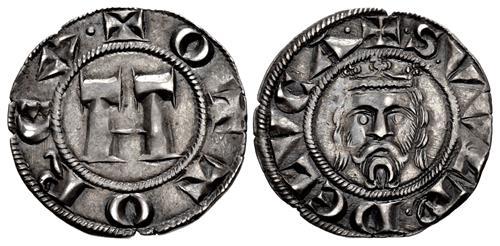
The Roman army was reformed, and a new capital building was constructed on the Capitoline Hill known as the Palazzo Senatorio (the Senate Palace), which still stands today but is much different after being heavily renovated by Michelangelo in the 1530's.
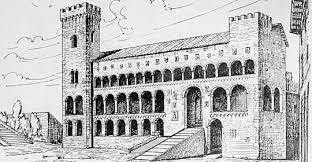
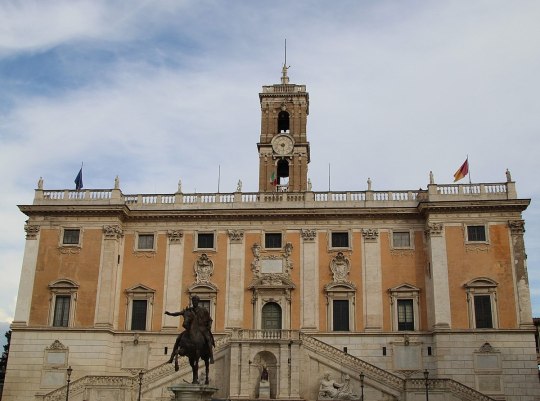
Originally the new Roman Republic swore fealty to the Holy Roman Emperor. However Rome and the Empire had a falling out. In 1149 the Roman Senate invited the German king Conrad III to the city to be coronated Roman Emperor. Rome's enemies were growing, so the Roman Senate offered Conrad this title in return for protection. Conrad had already been elected as Holy Roman Emperor and was due to be coronated, but the Roman Senate was proposing that he be THE Roman Emperor, as in like, a real Roman Emperor whose authority is defined by the Roman Senate, and not a Holy Roman Emperor whose authority was defined by the Pope and a loose confederation of high ranking German, Italian, Austrian, and Czech nobles. In the Holy Roman Empire the emperor is elected by the highest ranking nobles of the land. The Roman Senate was claiming that it had the authority to choose Roman emperors as the senate did during the ancient Roman Empire. Well, lets just say that Conrad probably didn't take too kindly to the Roman Senate attempting to usurp the governing structure of the Holy Roman Empire. In the middle ages a group of lower class burghers and knights cosplaying as Roman senators was not a good basis for a Europe spanning universal imperial monarchy. When Conrad died he was already cutting a deal with the Pope to snuff out the republic.
Conrad died in 1152 but his successor, Frederick Barbarossa continued the deal with the Pope to end the Roman Republic. It was one of the few times Frederick and the Pope agreed on anything. In 1155 a combined Papal/Imperial army invaded Rome. The city quickly fell and Arnold of Brescia was captured and burned at the stake. His ashes were scattered into the Tiber River.
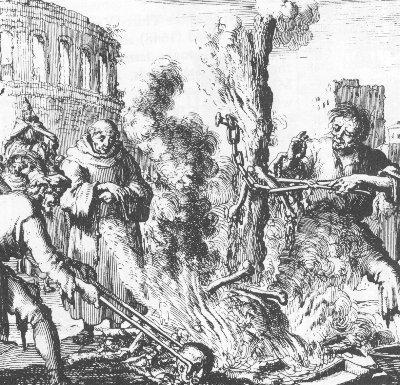
Amazingly the Roman Republic lived on. Frederick Barbarossa was coronated by Pope Adrian IV as Holy Roman Emperor, an act which led to a new revolt among the Romans. Frederick put down this revolt, killing 1,000 Romans in the process, but afterwards he simply left the city and never returned after becoming bogged down in the complex politics of Italy. The Pope also left Rome, having to deal with a papal schism, resulting in no one being left in charge of the city and thus another restoration of the Roman Republic.
In 1167 Rome made war on the neighboring city of Tusculum, a long time rival of Rome who had supported the Pope and became a papal capital after the foundation of the republic. The Count of Tusculum appealed for help to the Holy Roman Empire, and Frederick I sent a small army of 1600 men. The Romans had an army of 10,000 made up of peasant militia who were poorly armed and poorly trained. While heavily outnumbered the Imperial army consisted of well armed and trained knights and professional soldiers. The Imperial army easily defeated the Romans at the Battle of Monte Porizio on May 29th, 1167, a battle which would later be called, "the Cannae of the Middle Ages". The Imperial army would continue to march on Rome, but by a stroke of luck for the Romans would be struck with the plague and forced to turn back. The Romans got their revenge against Tusculum in 1183 when they conquered and burned the city to the ground Carthage style.
The beginning of the end of the republic came in 1188 when Pope Clement III made a power sharing deal with the senate in which the people would elect senators but the Pope would have to approve the senators. The senate agreed to this in order to secure the protection of the Pope as the Holy Roman Empire was still a threat. Over the coming decades popes would reduce the number of senators until by the early 13th century, there was just one. Soon that single senate post was directly chosen by the Pope, and eventually it became a hereditary position. Before you knew it, French and Spanish nobles were becoming Roman senators and Roman senators ruled as autocrats at the behest of the Pope. By the end of the 13th century, the Roman Republic was dead.

154 notes
·
View notes